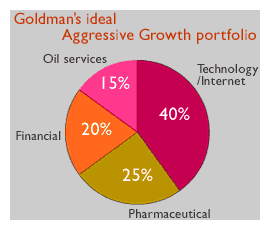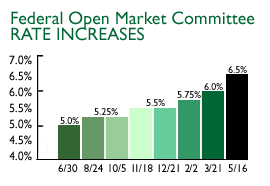NEW YORK (CNNfn) - So you think the economy is slowing down and you finally have some time to think about what to do with your money. Is technology all it's cracked up to be, or do you think you may be overlooking some other worthwhile investing sectors?
Analysts agree that investors should be choosy about where they put their money, but they differ in recommending their favorite sectors. Some like technology, feeling that the sector has been beaten down enough and is now providing good value. Others like "old economy" type stocks, such as financial services, that could provide balance in the face of a slowing, more stable economy.
Grace Fey, portfolio manager with Frontier Capital Management, told CNNfn's market coverage that companies with proven earnings will survive, while cyclical companies that depend on a strong economy may struggle (454K WAV) (454K AIFF).
Barry Hyman, chief market strategist at Ehrenkrantz King Nussbaum, agreed. "From the individual investor point of view, I would not overweight myself in the consumer cyclicals. I would make tech my No.1 sector and I would make financials No.2."
 Hyman said that technology leaders have been beaten down enough and are now ripe for picking. But, he warned, investors should stick with the larger blue-chip tech stocks that show good growth. Hyman said that technology leaders have been beaten down enough and are now ripe for picking. But, he warned, investors should stick with the larger blue-chip tech stocks that show good growth.
He also recommended financial stocks because he sees the sector as a growth area that is turning around now that interest rate hikes may be ending.
But Alan Kral, portfolio manager at Trevor Stewart Burton & Jacobsen, steered away from financials, saying their future strength was largely dependent on the Fed's interest rate policy. Higher interest rates may slow down borrowing -- and thus dry up a key source of revenue for banks and other financial institutions.
Among Kral's favorite sectors are leisure time, oil, and biotechs. Leisure stocks are driven by strong growth in family spending and income. Rising oil prices, said Kral, are in a secular trend and may soften but not sink. And he said the biotech industry is attractive because it provides good potential blockbuster revenue growth through new pharmaceutical discoveries.
His top three stocks are Amgen (AMGN: Research, Estimates), Schlumberger (SLB: Research, Estimates), and Disney (DIS: Research, Estimates).
AG Edwards' chief market strategist Al Goldman said he would advise investors to put money in technology, telecommunications and Internet stocks. But he also said it was important to keep a diversified outlook and portfolio, citing pharmaceuticals, financials and oil service stocks as good opportunities to maintaining balanced long-term growth.
"You stay away from those companies that are most sensitive to general economic activity such as autos, steels, aluminums, and specialty chemicals," he said. "Those companies that have been lagging will continue to lag."
Analysts agree that the market is lacking consensus, but there is no need for investors to become aggressive at this stage in the game. They advise that you use your judgment, be willing to add positions in a downturn, and also be willing to hold onto your cash. "It depends totally on their investment objective," said Goldman of investors.
Economy in slow motion
With an economic slowdown in place, will the Fed raise interest rates one more time, and how do investors protect themselves against risky moves?
"I believe the Fed will engineer this slowdown and it won't result in a hard landing," said Hyman. This is good news for investors if it comes to fruition but there will still be risks along the way.
There is little argument among analysts that the economy is indeed moving at a slower pace, but some argue it is cyclical and not a result of the Federal Reserve's succession of interest rate hikes.
"It's a really tough situation to determine what's going on," said Kral. "Where we see the risks is that the economy has slowed down on its own and the Fed is piling on which will slow it down even more."
So, what does that mean for investors? Do not despair. There is still valid advice about what steps you can take to protect and grow your money.
"I think individuals should still be willing to buy weakness out there," said Hyman. "I don't think we're entering another bear market right now."
 Analysts said the wealth effect -- a change in value of a person's assets that allows them to spend more than they normally would -- is still in effect, providing investors with cash to play with. "In a slower economy, which is good long term, money will go after those companies best positioned to grow their earnings," said Goldman. Analysts said the wealth effect -- a change in value of a person's assets that allows them to spend more than they normally would -- is still in effect, providing investors with cash to play with. "In a slower economy, which is good long term, money will go after those companies best positioned to grow their earnings," said Goldman.
"The market has created this wealth effect because there have been a lot of gains over the past two or three years," said Hyman. "That has provided the ability for consumers to increase spending on regular goods and luxury goods."
Is the Fed really finished?
After six interest rate hikes by the Federal Reserve since last June, investors and analysts are hopeful that the next meeting of the Fed's policy-making committee may finally reign in the economy. The Federal Reserve will meet again June 27-28.
"The economy is showing definite signs of slowing down to a healthier rate of expansion," said AG Edwards' Goldman. "I think the reason, good or bad, could be laid at the feet of the Fed."
Some analysts expect one more rate hike while others said that the Fed will more likely take a break from raising rates to see if the economy is truly slowing, as shown by the evidence piling up from positive economic data.
 "The stock market now faces two primary risks. First, the economy could slow too much, which would jeopardize profit performance. Second, a strong rebound in stocks could stoke consumer spending and renew concerns about overheating and additional interest rate hikes," wrote Lynn Reaser, chief economist at Bank of America Asset Management Group, in a note to clients. "The stock market now faces two primary risks. First, the economy could slow too much, which would jeopardize profit performance. Second, a strong rebound in stocks could stoke consumer spending and renew concerns about overheating and additional interest rate hikes," wrote Lynn Reaser, chief economist at Bank of America Asset Management Group, in a note to clients.
The lesson here is to maintain some modicum of cautious optimism. "I think the trend is so important here and it's starting to be developed," said Hyman. "But in light of everything, even if the Fed does back off, the thought of a 'hard' versus 'soft landing' is still going to be out there -- which is going to prevent outrageous gains." 
|

